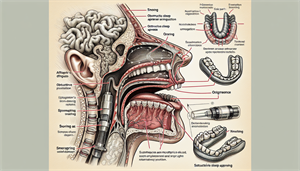
Key Takeaways
-
Anti-snoring mouthpieces operate by repositioning the jaw or tongue to maintain a clear airway during sleep, thus addressing the airway blockage that causes snoring and can combat sleep apnea symptoms.
-
Though anti-snoring mouthpieces may be less effective than CPAP therapy, they are considered a more comfortable and convenient alternative for treating mild to moderate sleep apnea and have better adherence among patients.
-
Mouthpieces require proper care, regular cleaning, and periodical replacement to remain effective and hygienic, and consulting a dentist or sleep specialist is advisable before using them, especially for individuals with existing dental health issues.
Understanding Snoring and Sleep Apnea
Snoring and sleep apnea are all about airway obstruction. When we sleep, our muscles, including those in the throat, relax. In some people, this relaxation can cause the tongue or throat tissues to block the airway partially or completely, leading to snoring or sleep apnea, respectively.
Chronic snoring can lead to daytime sleepiness, mood swings, and even an increased risk of accidents. Hence, finding a solution like an anti-snoring mouthpiece is not just about ensuring a peaceful night’s sleep, but also about promoting overall well-being.
Sleep apnea is a more severe form of snoring, where the breathing stops intermittently during sleep. This condition is often accompanied by loud snoring, gasping, and choking sounds, disrupting the sleep cycle and leading to daytime fatigue.
If left untreated, sleep apnea can lead to more serious health problems, such as high blood pressure and heart disease, making it crucial to treat it promptly with effective solutions like anti-snoring mouthpieces.
Causes of Snoring
The root cause of snoring is the vibration of soft tissues in the throat due to partial airway obstruction. This blockage can occur due to several factors, including age-related muscle tone loss, nasal congestion, and medical conditions associated with obesity. Snoring can also be exacerbated by your sleep position. Sleeping on your back can cause your tongue to fall into the back of your throat, which can further block the airway and lead to breathing difficulties.
This position can potentially disrupt normal breathing patterns during sleep. Mandibular Advancement Devices (MADs) are one type of anti-snoring mouth guard that can help address this issue.
Comprehending these factors is fundamental for treating snoring. Understanding the causes of snoring aids in developing efficient treatment strategies. Different types of snoring may require different types of mouth guards. For instance, snoring caused by tongue obstruction might be better treated with a mouth guard designed to keep the tongue in place, such as a tongue retaining device.
On the other hand, snoring caused by the lower jaw falling backward might be better treated with a mandibular advancement device, which helps to keep the lower jaw forward, preventing the tongue from blocking the airway.
Obstructive Sleep Apnea (OSA)
Obstructive Sleep Apnea (OSA) is a serious sleep disorder that takes snoring to a whole new level. It involves explosive snoring, grunting, and gasping sounds due to temporary airway obstruction caused by tissue at the back of the throat.
This results in repeated pauses in breathing during sleep, leading to decreased oxygen levels in the blood and disrupting the sleep cycle. OSA can have severe health consequences if left untreated, including an increased risk of heart disease, stroke, and diabetes. Therefore, it is essential to address OSA with effective treatment options, such as anti-snoring mouthpieces.


